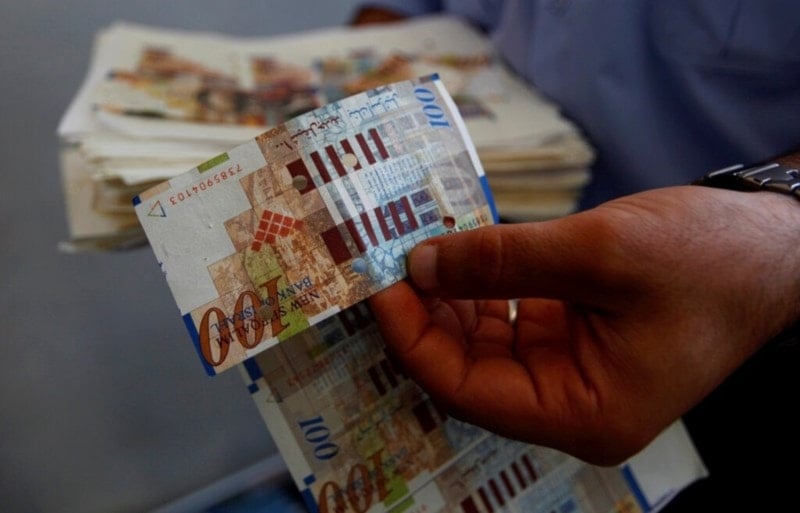From lower ratings to higher deficits, Israeli economy in hot water
The nearly year-long onslaught on Gaza has severely harmed the Israeli economy and resulted in higher deficits, worse credit ratings, a damaged tourism sector, and continued public spending.
-

An Israeli policeman displays counterfeit 100 Israeli Shekel bills on July 7, 2013. (AP)
The Israeli occupation's economy slowed the most among the 38 members of the Organization for Economic Cooperation and Development (OECD) from April to June, as "Israel's" protracted war on Gaza continues to hinder its financial standing.
According to the OECD, "Israel experienced the most significant slowdown" as GDP plummeted from 4.1% in the first three months of the year to 0.3% in the second quarter. According to preliminary estimates, the OECD's GDP increased by 0.5% in the second quarter of 2024, matching the rate of the previous quarter. According to the figures, the US economy grew by 0.7% in the second quarter, up from 0.4% in the first.
In May, the OECD reduced the Israeli economy's growth prediction for this year to 1.9% from 3.3%, with a projected 4.6% in 2025. The Bank of Israel dropped its 2024 growth prediction to 1.5%, while the Finance Ministry expects 1.9% growth this year.
JP Morgan cuts Israeli growth outlook, as Citi warns of further rating downgrades
JPMorgan Chase, a US investment firm, has cut its prediction for "Israel's" economy for this year and 2025, citing recent macroeconomic data that "surprised negatively".
In a new analysis released late Tuesday headlined "Israel: Not a great combo of growth and inflation data," the US bank decreased its 2024 growth forecast for the Israeli economy from 1.6% to 1.4% and its 2025 prediction from 4.5% to 4.4%. That is lower than the Bank of Israel's 1.5% growth forecast for 2024.
JPMorgan analyst Anatoliy Shal warned in the research note that annualized growth of only 1.2% in the second quarter was "significantly below expectations" of its prediction of 5.8% and below.
“The loss of momentum compared to 1Q was evident in high-frequency data, but the extent of it was certainly a surprise,” Shal added. “Business investment was the main negative news, along with a continued decline in exports.”
According to an early estimate provided last week by the Central Bureau of Statistics, GFP per capita fell by 0.4% in the second quarter.
The economy rebounded at the start of the year, rising at an annualized 17.3% in the first three months of the year after contracting by 20.6% in the fourth quarter of 2023 when the onset of the war on Gaza drastically reduced consumer spending, trade, and investment.
Shal emphasized that the "inflation picture remains difficult in Israel" as the annual rate in July unexpectedly rose beyond the government's 1-3% annual goal range, reaching 3.2% from 2.9% in June.
JPMorgan predicts inflation to grow to 3.3% in 2024, up from its earlier prediction of 3%.
Shares in the Tel Aviv Stock Exchange fell on Wednesday after Bank of Israel Governor Amir Yaron urged Prime Minister Benjamin Netanyahu the day before to expedite the process of debating and approving the 2025 state budget, emphasizing that financial markets seek responsible fiscal policy even during times of war.
Yaron underlined that Fitch's reduction of "Israel's" credit rating last week represents "an assessment of the management of current economic policy and puts emphasis on future policy."
Fitch maintained a negative outlook on the economy, leaving room for further downgrades and citing concerns about the handling of the potential fiscal impact of war-related "additional military spending, infrastructure destruction, and more sustained damage to economic activity and investment." It is the third major credit agency to downgrade "Israel's" credit rating this year, after S&P and Moody's.
'Israel's' economy is suffering and economists say the solution is to end the war
The nearly year-long onslaught on Gaza has severely harmed the Israeli economy and resulted in higher deficits, worse credit ratings, a damaged tourism sector, and continued public spending.
The financial costs of rebuilding, paying casualties, and improving defensive systems have been significant. Economist Jacob Sheinin predicted a $14 billion GDP loss this year, citing that "we are losing much more."
Despite Prime Minister Netanyahu's claims that the damage is just temporary, the protracted aggression has had a significant impact on small enterprises, international trust, and tourism.
Leading economists believe a ceasefire is the only way to halt the harm.
According to Sheinin, “If we are stubborn and continue this war, we will not recover.”

 5 Min Read
5 Min Read








